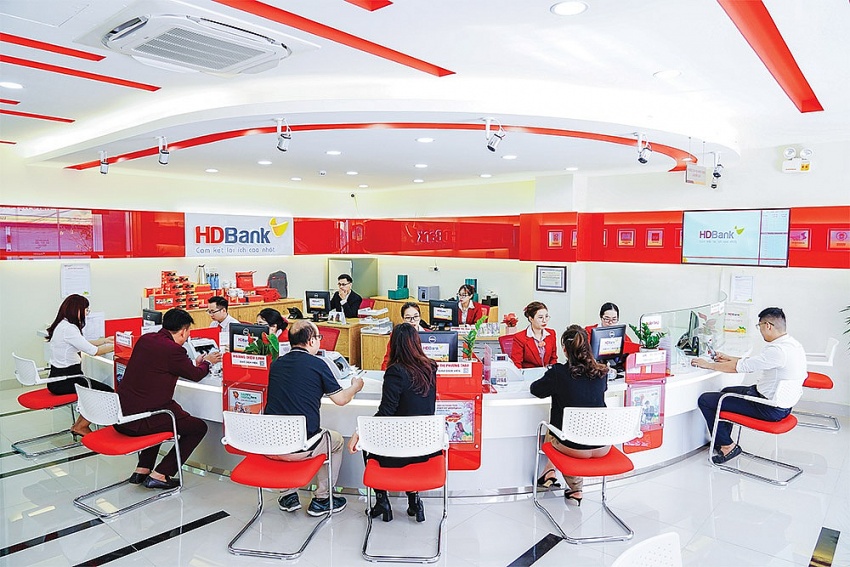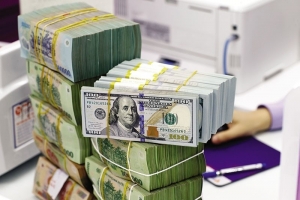Interest rates likely to remain fairly levelled
 |
| Experts believe there is not currently much room for deposit interest rate cuts, photo Le Toan |
In a discussion with VIR last week, Tran Duc Anh, head of Macro & Market Research at KB Securities, noted that the deposit interest rate landscape has hit record lows, while lending rates have relatively adjusted from their late 2022 peak, providing strong support for liquidity in the stock market over several quarters.
Specifically, in the first three months of the year, with credit growth at a low level and domestic consumption still weak, exchange rate pressures have not directly impacted the market interest rate landscape. In spite of this, the interest rate landscape continues to decline, contributing to increased market liquidity, with multiple trading sessions exceeding $1 billion in value.
“However, we do not believe that there is further room for deposit interest rate cuts given that the overall landscape is at historically low levels, while inflationary pressures and exchange rates signal caution,” Anh said. “Additionally, credit is expected to gradually recover in the latter half of 2024, corresponding to economic growth recovery. In the base scenario, the interest rate landscape is expected to remain flat or see slight upward movement in the low range, continuing to support the stock market.”
The State Bank of Vietnam (SBV) disclosed that while interest rates remain favourable, the banking sector grapples with subdued credit growth, recording a modest 1 per cent increase in total credit growth by April 10, falling short of the nearly 2.5 per cent pace seen during the same period last year.
Dinh Duc Quang, country head of Global Markets at United Overseas Bank (UOB) Vietnam, also believed that savings interest rates are currently at historic lows and may have bottomed out in the overall assessment of this low-risk investment channel compared to inflation, exchange rates, and capital demand in the economy.
“Low credit demand stems from various factors and may take time to return to normal levels. One contributing factor is the divestment of businesses in 2023,” Quang said.
According to the Ministry of Planning and Investment, the first three months of 2024 saw 53,400 businesses with halted operations – up 24.5 per cent on-year; 15,500 businesses stopped operations waiting for dissolution procedures – up 21.7 per cent; and 5,100 enterprises completed such procedures.
In an effort to maintain stability, Dao Minh Tu, Deputy Governor of the SBV, cautioned against aggressive lending practices, citing the escalating trend of non-performing loans (NPLs), which reached 4.55 per cent by the end of 2023.
“In 2023 alone, there was a 2.03 per cent increase in domestic NPLs, not to mention the restructured NPLs, sold to Vietnam Asset Management Company but not yet resolved,” stated Tu.
According to him, these rates indicate that credit cannot be aggressively expanded, disregarding standards, to prevent the economy from being burdened with NPLs, becoming a clot like it did over a decade ago, which still has not been fully resolved.
Dinh Cong Luyen, an analyst of MB Securities, projected a stabilisation of deposit interest rates in the second quarter of 2024, anticipating a slight increase of 0.3-0.5 per cent. He attributed this to gradual economic recovery and improving credit conditions.
“Despite the challenges, positive indicators in the economy, such as robust export performance and gradual real estate market recovery, offer hope for improved credit growth in the coming months,” Luyen said. “As of April 10, the credit growth of the economy reached over 1 per cent, although still low, indicating a gradual recovery in capital demand within the economy. This will impact the short-term business capital and foreign exchange plans of credit institutions.”
In addition, maintaining the current low interest rates by the SBV will have a positive impact on expanding business and increasing inventory levels for businesses, facilitating strong credit growth improvement in the next six months, Luyen added.
Yun Liu, economist at HSBC, noted that while monthly food prices fell, rice inflation remains elevated at double-digits.
“We continue to caution upside risks to food and energy inflation, though we do not believe inflation will likely overshoot the SBV’s 4.5 per cent inflation ceiling this year. Therefore, we do not expect the SBV to ease anytime soon,” she said. “We expect it to hold its policy rate steady at 4.5 per cent over our forecast horizon through 2025.”
 | VIR hosting talk show on the stock market stability and sustainability VIR hosted a talk show on April 4 about the stock market's prospects in 2024. |
 | Vietnamese businesses grapple with surging exchange rates Surging exchange rates spark investor caution as the Vietnamese dong's sharp rise against the US Dollar imposes wide-ranging impacts on businesses. |
 | How supply and demand support the fund market in Vietnam In the current environment marked by record-low interest rates, unpredictable fluctuations in gold prices, and numerous uncertainties in the stock market, many individual investors are turning to fund certificates as a viable and sustainable investment option. Dr. Na Sung Soo, CEO of Vina Securities, delves into the situation in Vietnam. |
 | Upward trend anticipated in forex rate The forex market faces augmented pressures in the second quarter of this year, which might be contained partially through central bank intervention. |
What the stars mean:
★ Poor ★ ★ Promising ★★★ Good ★★★★ Very good ★★★★★ Exceptional
Related Contents
Latest News
More News
- Raised ties reaffirm strategic trust (February 20, 2026 | 14:06)
- Sustained growth can translate into income gains (February 19, 2026 | 18:55)
- The vision to maintain a stable monetary policy (February 19, 2026 | 08:50)
- Banking sector faces data governance hurdles in AI transition (February 19, 2026 | 08:00)
- AI leading to shift in banking roles (February 18, 2026 | 19:54)
- Digital banking enters season of transformation (February 16, 2026 | 09:00)
- IFC to grant $150 million loan package for VPBank (February 13, 2026 | 09:00)
- Nam A Bank forms position as strategic member at VIFC through three key partnerships (February 12, 2026 | 16:39)
- Banks bolster risk buffers to safeguard asset quality amid credit expansion (February 12, 2026 | 11:00)
- VNPAY and NAPAS deepen cooperation on digital payments (February 11, 2026 | 18:21)

 Tag:
Tag:



















 Mobile Version
Mobile Version